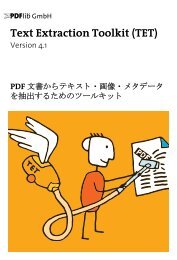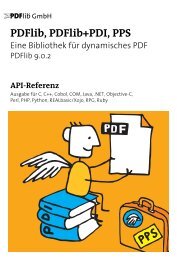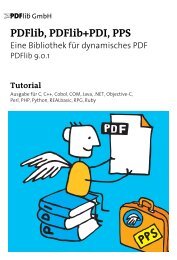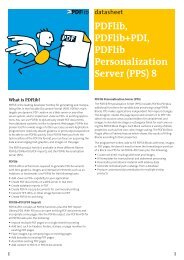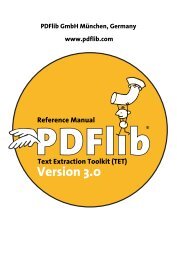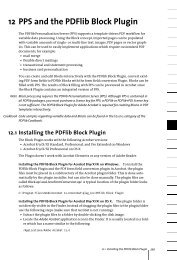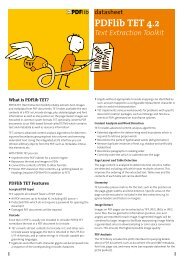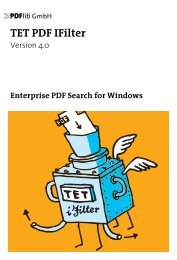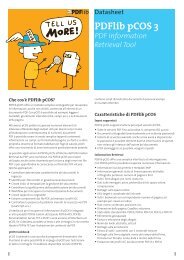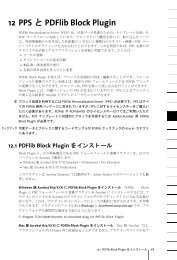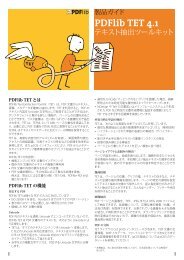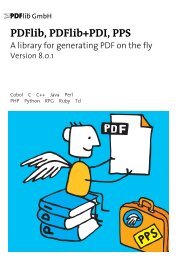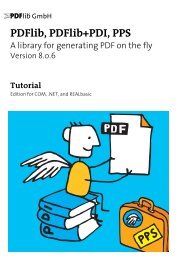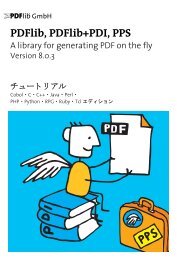PDFlib Text Extraction Toolkit (TET) Manual
PDFlib Text Extraction Toolkit (TET) Manual
PDFlib Text Extraction Toolkit (TET) Manual
You also want an ePaper? Increase the reach of your titles
YUMPU automatically turns print PDFs into web optimized ePapers that Google loves.
0.2 Applying the <strong>TET</strong> License Key<br />
Using <strong>TET</strong> for production purposes requires a valid <strong>TET</strong> license key. Once you purchased<br />
a <strong>TET</strong> license you must apply your license key in order to allow processing of arbitrarily<br />
large documents. There are several methods for applying the license key; choose one of<br />
the methods detailed below.<br />
Note <strong>TET</strong> license keys are platform-dependent, and can only be used on the platform for which they<br />
have been purchased.<br />
Windows installer. If you are working with the Windows installer you can enter the license<br />
key when you install the product. The installer will add the license key to the registry<br />
(see below).<br />
Working with a license file. <strong>PDFlib</strong> products read license keys from a license file,<br />
which is a text file according to the format shown below. You can use the template<br />
licensekeys.txt which is contained in all <strong>TET</strong> distributions. Lines beginning with a ’#’<br />
character contain comments and will be ignored; the second line contains version information<br />
for the license file itself:<br />
# Licensing information for <strong>PDFlib</strong> GmbH products<br />
<strong>PDFlib</strong> license file 1.0<br />
<strong>TET</strong> 4.2 ...your license key...<br />
The license file may contain license keys for multiple <strong>PDFlib</strong> GmbH products on separate<br />
lines. It may also contain license keys for multiple platforms so that the same license<br />
file can be shared among platforms. License files can be configured in the following<br />
ways:<br />
> A file called licensekeys.txt will be searched in all default locations (see »Default file<br />
search paths«, page 9).<br />
> You can specify the licensefile option with the set_option( ) API function:<br />
tet.set_option("licensefile={/path/to/licensekeys.txt}");<br />
The licensefile option must be set immediately after instantiating the <strong>TET</strong> object, i.e.,<br />
after calling <strong>TET</strong>_new( ) (in C) or creating a <strong>TET</strong> object.<br />
> Supply the --tetopt option of the <strong>TET</strong> command-line tool and supply the licensefile<br />
option with the name of a license file:<br />
tet --tetopt "licensefile=/path/to/your/licensekeys.txt" ...<br />
If the path name contains space characters you must enclose the path with braces:<br />
tet --tetopt "licensefile={/path/to/your/license file.txt}" ...<br />
> You can set an environment (shell) variable which points to a license file. On Windows<br />
use the system control panel and choose System, Advanced, Environment<br />
Variables; on Unix apply a command similar to the following:<br />
export PDFLIBLICENSEFILE="/path/to/licensekeys.txt"<br />
On i5/iSeries the license file can be specified as follows (this command can be specified<br />
in the startup program QSTRUP and will work for all <strong>PDFlib</strong> GmbH products):<br />
ADDENVVAR ENVVAR(PDFLIBLICENSEFILE) VALUE() LEVEL(*SYS)<br />
8 Chapter 0: First Steps with <strong>TET</strong>



